|
Dolce far niente
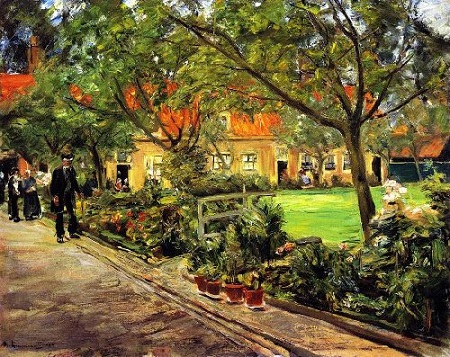
Ziekenhuistuin in Edam door Max Liebermann, 1904
Andante
Als de tocht niet meer voert naar de
plaats waar alles weer goed komt,
wat houdt haar gaande? Rood zand
op het fresco verbleekt, troost verkleint
tot een blik, tot een handpalm.
Als niet wanhoop met windkracht tien
in haar rug staat, wat houdt haar in gang?
De straatstenen houden haar gaande
ogen likken de gevels, de keel
is gulzig naar lucht. Haar houdt
in gang het plezierpaard lijf dat
geen halt verstaat. Haar hakken
slaan vuur uit de tegels: Dat zij gaat
houdt haar gaande. Zij gaat.
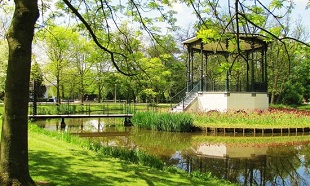
Anna Enquist (Amsterdam, 19 juli 1945)
Het Vondelpark in Amsterdam, de geboorteplaats van Anna Enquist
De Vlaamse dichter Jan Lauwereyns werd geboren op 13 mei 1969 in Antwerpen. Zie ook alle tags voor Jan Lauwereyns op dit blog.
De paradox van slaap
Die muurschildering, de vogel op hoge stelt,
de twee speren, de bizon, de man met armen
wijd, liggend tegen lucht, zijn pik stijf.
Waar gaat dit naartoe?
Nergens: nacht, land van wat
niet bestaat.
Wat richt die vogel/ziel
op hoge stelt/hakken uit?
Op het tipje van je tong begint de wacht.
Kon je maar als een dolfijn
slapen met een hersenhelft,
rondjes varen met de andere.
Het temmen
Voor rijst gebeurde het in China,
een zevental millennia geleden.
De dichter zegt: ‘in Middelaarde, toen
de tijd nog niet bestond’. De wetenschapper
maakt koeken en knabbelt.
De afstand vergroot in de vertaling van de ene
algemeenheid naar de andere.
Lege spelletjes, dacht ze, energie uit fotosynthese,
altijd hetzelfde liedje, een extra laag
maar niets dat blijft hangen.
Tan telt niet. Ook Guo-Ping niet.
Glo-Ping?
Ben je grapjes aan het maken?
Want grappig is het niet. Als je zo
blijft doorgaan...
(Hij snapte het.)
(Zowel de dichter als de wetenschapper.)
Tarwe en gerst suggereren: zachtjesaan.
Heb je het ook gevoeld
Heb je het ook gevoeld
een flurry of beginningen
mission impossible
dat rest wat rest
en blijvend moge blijven
de tot verlangen bekeerde
want o
mijn lieve lijdend
voorwerp van aandacht
het zwijgen in alle vuren
onvermogelijk
heffe zich het glas
je bubbly
mijn elixir
met randy
op het randje
lippen die nodig willen
jij mag kiezen waar.
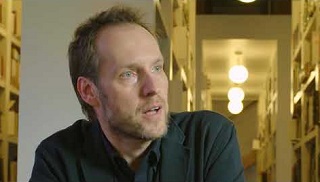
Jan Lauwereyns (Antwerpen, 13 mei 1969)
De Vlaamse dichter Reinout Verbeke werd geboren op 13 mei 1981 in Roeselare. Zie ook alle tags voor Reinout Verbeke op dit blog.
Honda asimo
De handleiding zegt dat je humanoid bent
dat je me in bed zult tillen
de deur openmaakt voor
bezoek, mijn zakdoek raapt
me vasthoudt
Volg me langzaam tot op de gang
tot in de eetzaal, tot in de kleine
witte kamer die ik ben
Hou daar pas mee op
tot ik de schroefbladen tussen je schouders
verwar met haar zuchten, de buzzer in je buik
met haar schoot. Spiegel me voor hoe zij was,
hoe zij destijds de deur
mijn zakdoek
mij
Wees, word, herinner me
Kom met je batterijen hart
naast me liggen
dat ik je een paar heel
dierlijke dingen leer
en kir kir kir dat het een lust is

Reinout Verbeke (Roeselare, 13 mei 1981)
De Engelse schrijver Bruce Chatwin werd op 13 mei 1940 in Sheffield geboren. Zie ook alle tags voor Bruce Chatwin op dit blog.
Uit: The Songlines
“When he did come to town, he worked from a disused newspaper shop-floor where rolls of old newsprint still clogged the presses and his sequences of aerial photos had spread, like a game of dominoes, over the shabby white walls. One sequence showed a three-hundred-mile strip of country running roughly due north. This was the suggested route of a new Alice to Darwin railway. The line, he told me, was going to be the last long stretch of track to be laid in Australia; and its chief engineer, a railway-man of the old school, had announced that it must also be the best. The engineer was close to retiring age and concerned for his posthumous reputation. He was especially concerned to avoid the kind of rumpus that broke out whenever a mining company moved its machinery into Aboriginal land. So, promising not to destroy a single one of their sacred sites, he had asked their representatives to supply him with a survey. Arkady's job was to identify the 'traditional landowners'; to drive them over their old hunting grounds, even if these now belonged to a cattle company; and to get them to reveal which rock or soak or ghost-gum was the work of a Dreamtime hero. He had already mapped the 1 so-mile stretch from Alice to Middle Bore Station. He had a hundred and fifty to go. 'I warned the engineer he was being a bit rash,' he said. 'But that's the way he wanted it.' 'Why rash?' I asked. 'Well, if you look at it their way,' he grinned, 'the whole of bloody Australia's a sacred site.' 'Explain,' I said. He was on the point of explaining when an Aboriginal girl came in with a stack of papers. She was a secretary, a pliant brown girl in a brown knitted dress. She smiled and said, 'Hi, Ark!' but her smile fell away at the sight of a stranger. Arkady lowered his voice. He had warned me earlier how Aboriginals hate to hear white men discussing their 'business'. 'This is a Pom,' he said to the secretary. 'A Porn by the name of Bruce.' The girl giggled, diffidently, dumped the papers on the desk, and dashed for the door. 'Let's go and get a coffee,' he said. So we went to a coffee-shop on Todd Street.”
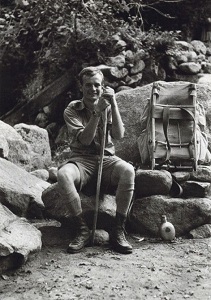
Bruce Chatwin (13 mei 1940 – 18 januari 1989)
De Britse schrijfster Daphne du Maurier werd geboren in Londen op 13 mei 1907. Zie ook alle tags voor Daphne du Maurier op dit blog.
Uit: Jamaica Inn
“They drove along the twisting lane to the farmhouse at the top of the village. A neighbour met them at the gate, her face eager to impart bad news. 'Your mother's worse,' she cried. 'She came out of the door just now, staring like a ghost, and she trembled all over, and fell down in the path. Mrs Hoblyn has gone to her, and Will Searle; they've lifted her inside, poor soul. They say her eyes are shut.' Firmly the doctor pushed the little gaping crowd away from the door. Together he and the man Searle lifted the still figure from the floor and carried her upstairs to the bedroom. `It's a stroke,' said the doctor, 'but she's breathing; her pulse is steady. This is what I've been afraid of — that she'd snap suddenly, like this. Why it's come just now, after all these years, is known only to the Lord and herself. You must prove yourself your parents' child now, Mary, and help her through this. You are the only one who can.' For six long months or more Mary nursed her mother in this her first and last illness, but with all the care she and the doctor gave her it was not the widow's will to recover. She had no wish to fight for her life. It was as though she longed for release, and prayed silently that it would come quickly. She said to Mary, 'I don't want you to struggle as I have done. It's a breaking of the body and of the spirit. There's no call for you to stay on at Helford after I am gone. It's best for you to go to your Aunt Patience up to Bodmin.' There was no use in Mary telling her mother that she would not die. It was fixed there in her mind and there was no fighting it. 'I haven't any wish to leave the farm, mother,' she said. 'I was born here and my father before me, and you were a Helford woman. This is where the Yellans belong to be. I'm not afraid of being poor, and the farm falling away. You worked here for seventeen years alone, so why shouldn't I do the same? I'm strong; I can do the work of a man; you know that.' 'It's no life for a girl,' said her mother. 'I did it all these years because of your father, and because of you. Working for someone keeps a woman calm and contented, but it's another thing when you work for yourself. There's no heart in it then.’
'I'd be no use in a town,' said Mary. 'I've never known anything but this life by the river, and I don't want to. Going into Helston is town enough for me. I'm best here, with the few chickens that's left to us, and the green stuff in the garden, and the old pig, and a bit of a boat on the river. What would I do up to Bodmin with my Aunt Patience?' 'A girl can't live alone, Mary, without she goes queer in the head, or comes to evil. It's either one or the other. Have you forgotten poor Sue, who walked the churchyard at midnight with the full moon, and called upon the lover she had never had? And there was one maid, before you were born, left an orphan at sixteen. She ran away to Falmouth and went with the sailors. 'I'd not rest in my grave, nor your father neither, if we didn't leave you safe. You'll like your Aunt Patience; she was always a great one for games and laughing, with a heart as large as life. You remember when she came here, twelve years back? She had ribbons in her bonnet and a silk petticoat."
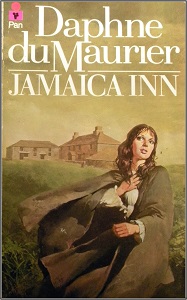
Daphne du Maurier (13 mei 1907 – 19 april 1989)
Cover
Zie voor nog meer schrijvers van de 13 mei ook mijn blog van 13 mei 2018 deel 1 en eveneens deel 2.
|



